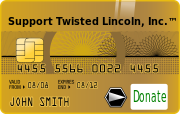You are here
The Tenth Amendment and End-User Licensing Agreements
by Tony Lovasco, President of Twisted Lincoln, Inc.
The Tenth Amendment to the United States Constitution reads: "The powers not delegated to the United States by the Constitution, nor prohibited by it to the states, are reserved to the states respectively, or to the people."
While not immediately obvious, the Tenth Amendment has some important implications. It essentially limits the powers of the United States Congress to those that are established within their Enumerated Powers (as listed in Article 1, Section 8 of the U.S. Constitution). All other legislative activities, at least in principle, are provided instead to the States, or to the people themselves.
In practice, the Tenth Amendment is limited by another part of Article 1 of the U.S. Constitution: The Elastic Clause. It reads: "The Congress shall have power …To make all laws which shall be necessary and proper for carrying into execution the foregoing powers, and all other powers vested by this Constitution in the government of the United States, or in any department or officer thereof."
The effect of the Elastic Clause essentially negates much of the Tenth Amendment, as it allows a very liberal interpretation of the Enumerated Powers.
Why is this an important debate when it comes to the subject of Licensing? Because there are two, very similar arguments in play when it comes to the powers of the End-User Licensing Agreements (EULAs) that typically accompany software products.
In the realm of licenses, the idea persists that when someone purchases a copy of a copyrighted work, they do not truly own the work, they simply own a license to use it. How, when, where, and for how long they are allowed to use the work are subject to the terms of the license. Unfortunately, there are no legal standards currently in effect that spell out the powers of a licensing agreement.
While most copyrighted works are licensed, the EULAs that usually come bundled with computer software products are the area that this lack of standards is most obvious.
A "license" is essentially a document (or other such means of conveying information) that grants you a limited right to do something you would not have otherwise had the right to do. For example, if one wishes to drive one's motor vehicle on the public streets, they must first obtain a driver's license, that provides them the right to drive within the limitations of the laws in the area that they are in.
So if a EULA is a license to do something you would not ordinarily have the right do to (use the software, for example), then is it not reasonable to assume that the license agreement be required to spell out (enumerate...) the rights that it is granting you?
Unfortunately, just as with the U.S. Constitution, there are two major sides to this issue. As with Congress, the mainstream belief creates a "Elastic Clause" with licensing -- that is to say that a copyright holder has the right to do almost anything it wants in the course of enforcing their rights to control their content. This includes insidious technological schemes such as Product Activation, or Digital "Rights" Management.
The other school of thought is that a EULA ought to be the sum total of the limitations that a software vendor can impose. Any restrictions that they wish to place on their users must be listed within the EULA in order to be binding.
Many suggest that such a radical change in licensing would effect all forms of copyrighted material (not just software). As it so happens, those people are correct. More often than not, no formal, written license agreement accompanies copyrighted material. When you buy a Compact-Disc or a book, only rarely does it include a license agreement. So how is a licensee supposed to know what their rights are, and what they are restricted from doing with their product? Currently, they must tread on eggshells, constantly in fear of being in violation of Copyright Law.
A "Tenth Amendment" view of licensing would change this. Instead of reading a EULA that spells out what you can do with a product, it would instead have to spell out what you cannot do with it. The importance here is clear. As it stands, it is assumed that because a license is the right to do something you do not already have the right do to, anything not specifically mentioned in a license agreement is forbidden. Unfortunately, it is almost impossible to include every possible use of an item within its license agreement, so often professional legal interpretation is required in order to decipher one's rights when reading a EULA. With products that do not include a written license, one could assume that the user has no rights at all, even to use the product in a rudimentary way.
If, however, we are to assume that "all of the powers not specifically granted to the user, or denied to the user are left to the user" then the burden of legal interpretation will rest more on the copyright holder, than on the licensee. It is far simpler, for example, for a company to list all of the possible uses it wishes to forbid, rather than all of those it wishes to permit.
More importantly, a "Tenth Amendment" style license would allow the average consumer to know exactly what they are able to do with a product. If a license is poorly written, the copyright holder will be the party that stands to lose, not the consumer.
A good example is a common restriction found in many modern EULAs:
The software product may only be installed on one computer system.
Under "Elastic Clause" licensing, it is unclear exactly what this means. Many software vendors would like it to mean that the software may only be installed on the first machine it is loaded on. Through Product Activation, they can currently technologically restrict you from moving the software to another machine.
However under "Tenth Amendment" licensing, this phrase simply restricts you to having the software loaded on a single machine. As it does not specify which machine, one could safely install it on any number of machines, provided that it is not installed on more than one system at the same time.
The error in clarity here is obviously caused by the person who wrote the EULA. Since the end user has no control over the wording of the license, it seems that if one party is to gain extra powers by such a lack of clarity, it ought to be the user, not the copyright holder. Otherwise, there is no motivation on the part of the people writing the EULA to be to the point-- as it stands, the more vauge and unclear they are, the more powers they reserve for themselves.
So assuming "Tenth Amendment" licensing came into effect, what would keep a copyright holder from simply including a statement in the license that read:
You are forbidden from doing anything with this product except:
a)
b)
c)
Well, the answer is nothing. But the point, however, is that any ambiguity in those bullet points would be up to the interpretation of the consumer. Just because the license forbids all other uses doesn't negate the points made above regarding the different possible ways to read an enumerated right. Because "Tenth Amendment" licensing puts the burden of clarity on the part of the copyright holder, even extremely restrictive licenses will allow a consumer to know what his or her rights are, simply because they will have to spell out what their rights are not.
As stated, such a change in licensing should effect all types of copyrighted material, not simply software. It is a travesty that one can purchase any number of copyrighted goods without having the slightest idea what you are legally allowed to do with them. Only with a dramatic adjustment in how rights are assigned and denied can this injustice be rectified.
While it is likely that such a change would come under fire by major copyright holders, it is fitting to remind people that for everything you create, you likely use ten times as many products that you did not. Even major copyright holders are consumers, and they stand to benefit from the clarity of this new licensing as much as anyone else.
Though many would argue that such a change would take away the rights of those who work hard to create original content, the reality is that it would not. A copyright holder would retain all of their rights to exclusively control the use, distribution, and other forms of conveying their work-- that is until they decide to sell a license for it. At that point, how many rights they wish to retain is up to them. They need be clear, concise, and accurate in their licensing, and they can hold on to as much power as they see fit.
It is the hope of Twisted Lincoln, Inc. that the Tenth Amendment be remembered when issues of Copyright Law are addressed. It is also our hope that until such revolutionary changes in Copyright Law can occur, another Constitutional Amendment will not be forgotten: The Ninth. It reads:
"The enumeration in the Constitution, of certain rights, shall not be construed to deny or disparage others retained by the people."
That is to say that just because we didn't say it, doesn't mean it isn't so. So until copyright holders are forced to tell us what we cannot do with their creations, let us hope that we still retain some of the rights that they conveniently forget to mention.
Such as the right to read a book we purchased, for example.
Copyright © 2003-2021 Twisted Lincoln, LLC.




